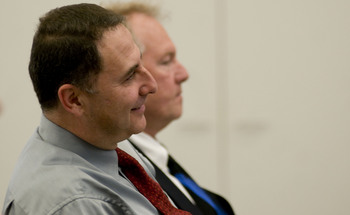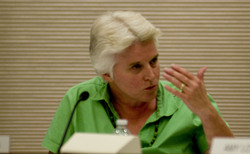*We plan on appealing this decision through the administrative process in Pittsfield Township. If this fails, we plan on filing a federal complaint with the Department of Justice as well as take civil action against the township.
***
Islamic school rezoning rejected by Pittsfield Township Planning
Commission
By Tom Perkins
annarbor.com Freelance journalist
August 5, 2011
A split Pittsfield Township Planning Commission rejected a rezoning request by a group hoping to build an Islamic school in the township.
In a 3-2 vote, the board voted to approve a motion to recommend that the Pittsfield Township Board of Trustees reject the zoning request by the Michigan Islamic Academy. The Board of Trustees has final authority and will vote on the issue at an upcoming meeting.
The biggest issue has been traffic concerns, but officials involved with the school say two separate traffic studies have found there would be little impact on traffic.
Commissioners Amy Longcore, Deborah Williams and Michael Yi voted to recommend against rezoning. Commissioners Michael Payne and Ann Harris voted against the recommendation. Commissioners Chris Wall and George Ralph weren’t present.
Harris and Payne both stated that the land will eventually be developed and there will be increased traffic no matter what is built. They said the traffic studies have shown residential development would actually cause more traffic than a school.
 Tarek Nahlawi (left) at Thursday night’s meeting.
Tarek Nahlawi (left) at Thursday night’s meeting.
Tom Perkins | For AnnArbor.com
Payne said he lives near a school and understands the traffic concerns, but said the increase would be minimal. He also pointed out that the planning commission always relied on traffic studies in the past and questioned why it’s now disregarding two studies.
“I think the traffic impact of a school will be less than 52 condos or a residential development – it is well-documented,” Payne said.
Williams disagreed, and she and Longcore both suggested the school find a different location that isn’t in a residential zone. They contended that residents in the neighboring Silverleaf subdivision didn’t know a school would be built next door when they purchased their homes, and to allow one would be unfair. “This is their home … and they bought this house thinking it was all residential lands,” Longcore said. “And it isn’t the only piece of land available in the township.”
The commissioners split their vote on the township’s findings along the same lines.
Tarek Nahlawi, an Islamic Academy board member, said he was disappointed with the vote. He said some of the issues commissioners said weren’t addressed – such as lighting, a landscape screen and pedestrian circulation – were brought up in meetings with the planning department and the commissioners had that information. He said the commissioners publicly stating that they didn’t have the information was “a cheap shot.”
About 125 residents attended and about 50 spoke during public comment. Most of those opposed to the plan stressed that they have no issue with the school being Islamic, but said their concerns centered around traffic, children’s safety and the school being inconsistent with the master plan.
Phil Stevens is a Silverleaf subdivision resident who said his property backs up to school’s property. He said the nearby Fortis school was also supposed to be a small school when it was built and it now has 750 students, which causes traffic issues in the area.
Plans call for a school that accommodates 360 kids, but he feared that the Islamic Academy and a possible community center could potentially bring several thousand people to the area.
Stevens said such a scenario would be “an absolute nightmare.”
“Nobody knows what things will be like 10 years from now,” he said. “The school could end up having 1,000 children, the community center could have 1,000 people.
“I don’t want to wake up 5-10 years and deal with thousands of people coming and going.”
Nahlawi clarified that the community center is no longer part of the plans. He said the school’s capacity will be 360 and 1,000 kids is “an amount we do not see reaching in the near future.” He also underscored that traffic studies indicated there wouldn’t be significant impact on traffic, and questioned why people continue to raise the issue.
“What is the point of conducting a study if its findings and facts are going to be refuted by opinion?” he asked the commissioners.
Supporters of the school highlighted the traffic studies and reiterated the school will remain small.
Several parents from the school pointed out there are 30 schools in Ann Arbor and, according to their findings, every school’s enrollment is higher than what is planned by the Michigan Islamic Academy. They also plotted the schools’ locations and each bordered residential zones. They questioned why none of those schools are considered a danger like the proposed the Islamic Academy.
The school is planned on a 26-acre parcel on the south side of Ellsworth, where Golfside dead-ends. Cars would exit via a new, short street that would create a four-way intersection at the dead-end.
 Planning Commissioner Deborah Wililams
Planning Commissioner Deborah Wililams
Tom Perkins | For AnnArbor.com
The driveway running in front of the school is designed to accommodate 70 cars and runs diagonally from Ellsworth to the new street. Nahlawi said the school, currently located on Plymouth Road in Ann Arbor, has nearly 200 students enrolled. Many families carpool and the school also has two buses and vans, Nahlawi said, so there wouldn’t be a situation where the traffic is backed up out to Ellsworth.
Dave Kubiske, an engineer with the David Archerconsulting firm, argued that the township’s master plan does allow for schools of a smaller size in residential zones.
The Council on American-Islamic Relationsrecently sent a letter to the U.S. Department of Justice asking them to monitor the situation. If the department finds evidence of a constitutional violation after the Board of Trustees makes its final decision, then it could launch a full investigation.
Lena Masri, a CAIR and Islamic Academy attorney, previously explained she believes the school’s religious rights could be violated because the township cannot deny it the right to operate due to a minor impact on traffic and noise. She said the traffic studies have demonstrated that traffic volume wouldn’t significantly increase.
At the meeting, she provided a detailed breakdown of how the site plan meets the township’s standards and stressed that the township cannot reject the plan based on subjective issues.
In a letter to the justice department, CAIR Director Dawud Walid expressed concern that opposed residents “negatively influenced the planning commission in making a decision against the Michigan Islamic Academy…” and stated that “derogatory remarks were also made regarding Muslims and their religious practice” during public comment at the June 16 meeting.
At the meeting, he told the commission a fear of property values dropping and other issues brought up are not legitimate reasons for the commission to reject a religious school that underReligious Institutions Land Use Protection Act.
Nahlawi said no adjustments would be made to the plan before it goes in front of the Board of Trustees. He said 60 percent of the school’s families live in Pittsfield Township and they aren’t finding another location or giving up.
“It’s not over yet,” he said.